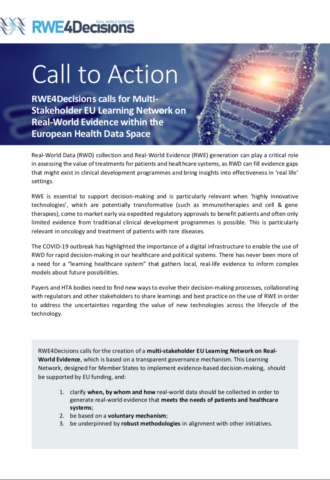RWE4Decisions calls for Multi-Stakeholder EU Learning Network on Real-World Evidence within the European Health Data Space.
Real-World Data (RWD) collection and Real-World Evidence (RWE) generation can play a critical role in assessing the value of treatments for patients and healthcare systems, as RWD can fill evidence gaps that might exist in clinical development programmes and bring insights into effectiveness in ‘real life’ settings.
RWE is essential to support decision-making and is particularly relevant when ‘highly innovative technologies’, which are potentially transformative (such as immunotherapies and cell & gene therapies), come to market early via expedited regulatory approvals to benefit patients and often only limited evidence from traditional clinical development programmes is possible. This is particularly relevant in oncology and treatment of patients with rare diseases.
The COVID-19 outbreak has highlighted the importance of a digital infrastructure to enable the use of RWD for rapid decision-making in our healthcare and political systems. There has never been more of a need for a “learning healthcare system” that gathers local, real-life evidence to inform complex models about future possibilities.
Payers and HTA bodies need to find new ways to evolve their decision-making processes, collaborating with regulators and other stakeholders to share learnings and best practice on the use of RWE in order to address the uncertainties regarding the value of new technologies across the lifecycle of the technology.
Call to Action
RWE4Decisions calls for the creation of a multi-stakeholder EU Learning Network on Real-World Evidence, which is based on a transparent governance mechanism. This Learning Network, designed for Member States to implement evidence-based decision-making, should be supported by EU funding, and:
1. clarify when, by whom and how real-world data should be collected in order to generate real-world evidence that meets the needs of patients and healthcare systems;
2. be based on a voluntary mechanism;
3. be underpinned by robust methodologies in alignment with other initiatives.
Policy Asks
To realise the potential of Real-World Evidence within the EU Health Data Space
RWE4Decisions has identified 5 key challenges and related policy asks to enable the cross-border use of real-world evidence by decision-makers.
Regulator and payer/ HTA requests differ according to the question being asked, the level of risk and other considerations such as the ability to capture other data, availability of other treatments and unmet medical need.
Develop a framework, for cross-country collaboration on studies underway across different jurisdictions to enable data amalgamation.
Funding to develop the infrastructure for cross organisational sharing of RWE generation plans and post-licensing evidence generation and information about RWD (HTA).
For trust in the quality of RWD in order to incorporate it into decision-making.
Ensure the European Health Data Space facilitates data quality and accessibility.
Develop evidentiary standards for RWE that take account of the context and agree on common core data elements (in terms of accuracy, completeness and tracability) to ensure validity and consistency across sources.
Promote comprehensive and internationally aligned harmonized guidance across bodies (epidemiology society, EUnetHTA, ISPOR, EMA…). Guidance to include how to reconcile differences between RWE data sets, and how RWE can complement Randomised Clinical Trial (RCT) data.
E.g. GDPR and data access.
Provide a framework for data security and privacy for individuals, while offering a clear legal basis for interoperability of health records across different data sources e.g. pre-existing data sets, electronic medical records, health insurance claims databases.
Ensure systematic patient involvement in RWD collection to capture “real-world” experience of patients.
Monitor level of impact of RWE on availability of highly innovative treatments across Europe (in terms of speed of access and quality of patient outcomes).
Promote the use of digitalized data in healthcare and medical practice.
Download the Policy Brief
